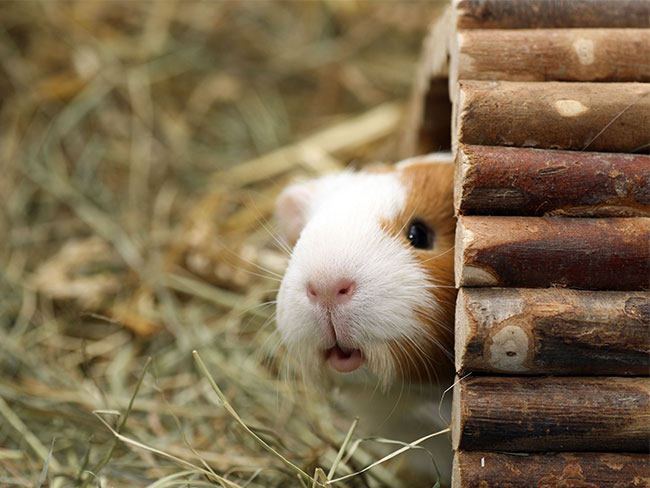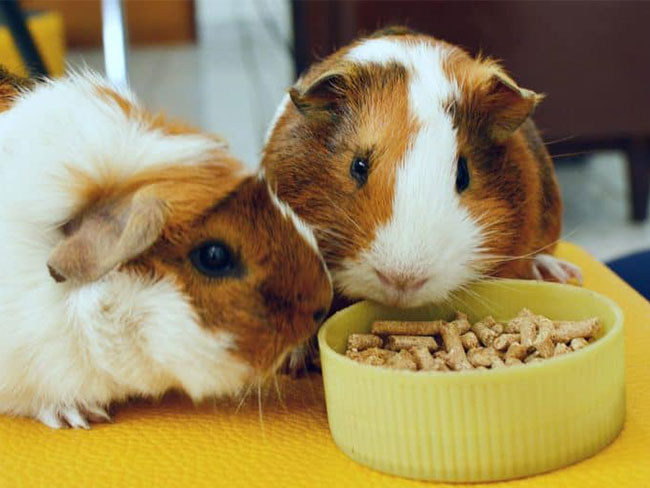Rabbits and guinea pigs share very similar lifestyles as they’re both small furry pets that eat hay and vegetables. Although it seems perfect to keep them together, unfortunately it can be very dangerous or even fatal if things go wrong, especially for the guinea pig. Therefore, it’s better for us to understand the differences between guinea pigs and rabbits before consider keeping both of them.
Why it is not a good idea to keep guinea pig and rabbit together?
There are three good reasons to keep them separately – dietary needs, disease and behavioral differences.
- Dietary Needs:
Although both rabbits and guinea pigs are plant eaters, there are significant differences.
Guinea pigs need a diet that is rich in vitamin C. Rabbits are much better at absorbing vitamin C from their food, and in fact can develop illnesses if they are exposed to too much of it. This is why guinea pig food and pellets are designed differently than rabbit food.
- Behavioral differences:
Rabbits and guinea pigs don’t have the same behavioral habits mainly because they are not of the same species. And since they certainly don’t speak the same language, their communication is not effective, this can lead to the rabbit becoming frustrated, and may attack or bully the guinea pig.
Otherwise, rabbits are larger than guinea pigs, and can easily injure a guinea pig without meaning to. That fluffy bunny of yours may well bully the guinea pig with his or her sharp claws, and when a rabbit jumps around and kicks its powerful hind legs, even when it’s just for fun or exercise, they can injure and overpower unassuming guinea pigs.
Rabbits may try to mount and mate with a guinea pig, and while the guinea pig can’t possibly become pregnant, it would likely cause the guinea pig to stress out and/or injury. Rabbits may also have a tendency to bully their smaller counterpart-guinea pigs, which can result in the guinea pig not getting enough nutrition it needs.
- Disease:
Although both species are affected by the same diseases such as Bordetella bronchiseptica – a cause of kennel cough in dogs, but much more severe and potentially fatal in guinea pigs. On the other hand, much milder and shows very few symptoms in rabbits, which poses a threat to a guinea pig in the same space.
Pasteurella is another disease that can go unnoticed in rabbits but can cause serious health problems for guinea pigs. The disease is often transmitted through saliva, usually from biting, some aggressive rabbits will do this to a guinea pig. Therefore, keeping them together may put guinea pig under risk of getting infected or even fatal.
Tips to keep your pets safe
If you’ve got a guinea pig and a rabbit who are already living together happily without any issues, it’s usually because they got to know each other when very young. It’s best not to separate them and here are some tips to keep them safe.
- Create a safe space for your guinea pig
Make sure the guinea pigs have a refuge area to hide away in – a pipe, pen or box with an entrance large enough for them but too small for the rabbit. If you see that they are spending all their time in the refuge, it may be that life is not as harmonious as it looks on the surface.
- Feed your pets separately
They have different dietary needs, so owner should make sure they have their own food bowls and that they are in their allocated spaces when they are eating. This way, you know they aren’t only getting the right food, they are also getting the recommended amounts.
- Ensure your rabbit is neutered
Rabbits have a propensity to mate everything and anything. This is dangerous and can result in severe back injury or even death. A neutered rabbit will be less inclined to mount its hutch-buddy, and also much less likely to fight. This is also a better way to keep your guinea pig safe.
If you have any enquires, or need more advice, please contact us, or make an appointment for consultation
Source:
Why keeping a rabbit and guinea pig together is not a good idea@Goddard vet group


